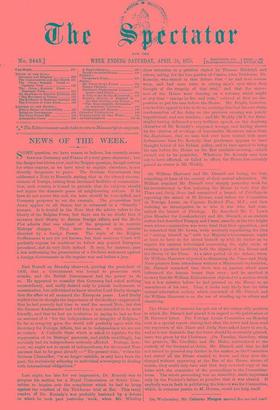On Wednesday, Mr. Osborne Morgan moved the second read-
lug of the Burials Bill,—from which he had this year eliminated those elaborate guarantees against any abuse by Dissenters of the privilege of conducting their own services in any national °brach- yard, which he had inserted—to no purpose—in his Bill two years ago. He pointed out that while there are but 531 cemeteries in England containing Nonconformist burial-grounds, there are between 12,000 and 13,000 parishes without any such burial- ground ; and in these parishes a Dissenter must be buried either without any funeral rites at all, or by persons and in the language -of services not always congenial, and sometimes objectionable, to the mourners. He had left out-the-so-called "safeguards" of his former Bill, because he found that every safeguard had practically served the obstructionists as a peg for hanging new safeguards on. He did not think that the imaginary pictures drawn of possible abuses really influenced anybody, and he was very anxious to ascertain what motive it was that brought out Mr. Disraeli in person against the Bill in 1872. He hoped it was not that unfortunate policy of exclusiveness which led an English vicar the other day to build-out the Noncomformist corpses from the Church corpses, —a story which reminded him of the widow in Oliver Goldsmith who objected to the corpse of a man who died of small-pox being buried beside that of her unvaccinated husband. Mr. Osborne Morgan hoped to elicit the real objection to this innocent Bill from the debate.



































 Previous page
Previous page